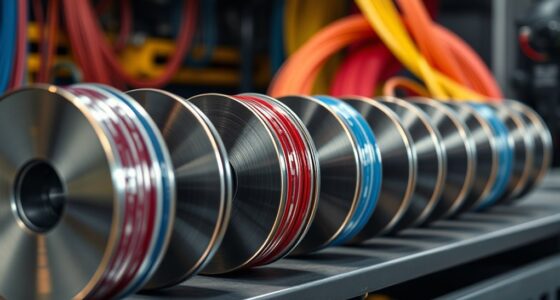If you’re looking for the 12 best cloud-connected NAS devices for seamless storage in 2025, I’ve got you covered. From high-capacity options like the UGREEN DH4300 Plus supporting up to 120TB, to user-friendly models like Buffalo LinkStation 220 and 210, and powerful enterprise solutions such as the Synology RS4021xs+. Whether you need simple personal backups or robust multi-user environments, these devices offer great performance, security, and compatibility. Keep going to discover the ideal solution for your needs.
Key Takeaways
- Highlights of top NAS devices with cloud connectivity and high storage capacity for 2025.
- Features emphasizing user-friendly setup, compatibility, and network connectivity options.
- Performance specs, hardware features, and scalability for various personal and enterprise needs.
- Security measures, data protection, and ideal use cases for each NAS model.
- Design, ease of use, and additional features that enhance seamless storage and remote access.
UGREEN 4-Bay Desktop NAS (DH4300 Plus)
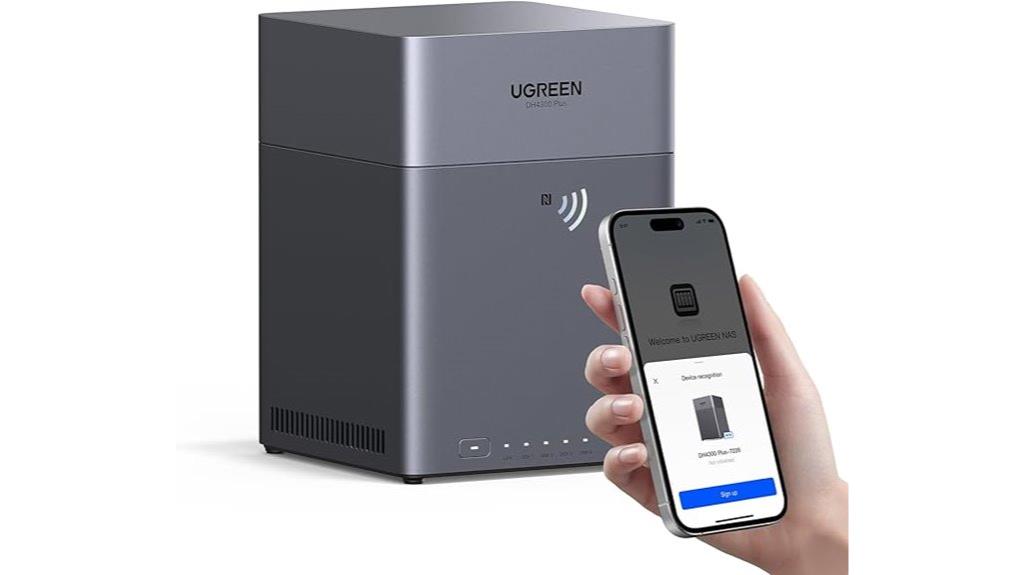
If you’re looking for a reliable, large-capacity storage solution that’s easy to set up and use, the UGREEN 4-Bay Desktop NAS (DH4300 Plus) is an excellent choice. It supports up to 120TB, perfect for storing millions of files, photos, and music. Compatible with third-party drives from brands like Western Digital and Seagate, it offers flexible expansion. The device boasts a high-performance processor, 8GB RAM, and a 2.5GbE port for fast transfers. Designed for beginners, it features simple setup with NFC, remote access from multiple devices, and supports 4K media output. It’s secure, cost-effective, and ideal for large-scale data management.
Best For: individuals or small businesses seeking a reliable, high-capacity, easy-to-use storage solution for large-scale data, multimedia, and backups.
Pros:
- Supports up to 120TB capacity with flexible expansion options from third-party drives.
- Fast data transfer speeds with a 2.5GbE port and high-performance processor.
- User-friendly setup featuring NFC, remote access, and support for various operating systems and media formats.
Cons:
- Disks are not included, requiring additional investment for storage drives.
- May be less suitable for users needing advanced enterprise-level features.
- Limited information on additional advanced security or customization options beyond basic encryption.
BUFFALO LinkStation 220 4TB NAS Storage with HDDs Included

The BUFFALO LinkStation 220 4TB NAS is an ideal choice for home users and small offices seeking straightforward, centralized storage with easy setup. It comes with two 2TB drives in a RAID 1 configuration, offering 2TB of secure data storage, with an option to switch to RAID 0 for 4TB. The device supports multiple platforms, including Windows, macOS, Android, and iOS, and features simple web-based management. Setup takes just minutes, and its basic backup utilities make file sharing and remote access easy. While transfer speeds are modest, the NAS provides reliable, easy-to-use storage perfect for media, documents, and backups.
Best For: home users and small offices seeking affordable, straightforward centralized storage with easy setup and basic backup features.
Pros:
- Simple, quick setup with user-friendly web interface
- Supports multiple platforms including Windows, macOS, Android, and iOS
- Comes with two HDDs in RAID 1 configuration for data security
Cons:
- Modest transfer speeds averaging 8-17 MB/s, which may be slow for some tasks
- Limited advanced features and utilities compared to higher-end NAS models
- Potential reliability issues with some users experiencing device failures or overheating
BUFFALO LinkStation 210 4TB NAS Storage with Hard Drives
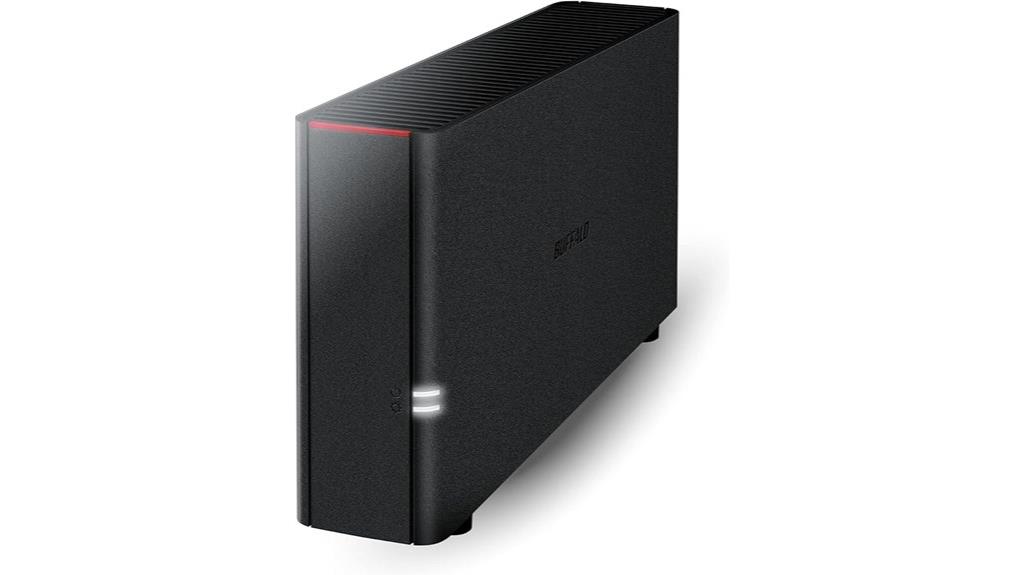
Buffalo LinkStation 210 is an ideal choice for home users seeking easy-to-set-up, centralized storage with built-in hard drives. It offers a straightforward way to create a personal cloud, backing up multiple devices effortlessly. Simply connect it to your router, and you’re ready to share files across Windows and macOS systems. With 4TB of storage, it supports secure file transfers via SSL encryption and provides automated backups through Buffalo’s user-friendly software. The device also allows you to control access, keeping your data private while sharing selectively. Although not the fastest model, it delivers reliable performance perfect for everyday home use.
Best For: home users seeking affordable, easy-to-use centralized storage and backup solutions for multiple devices.
Pros:
- Simple setup with plug-and-play connection to router
- Supports secure file sharing with access controls
- Includes 4TB hard drives for immediate use
Cons:
- Not designed for high-performance or intensive data tasks
- Limited to a single drive bay, restricting scalability
- Slightly slower speeds compared to higher-end models
Yxk Zero1 2-Bay Desktop NAS with Quad-Core CPU
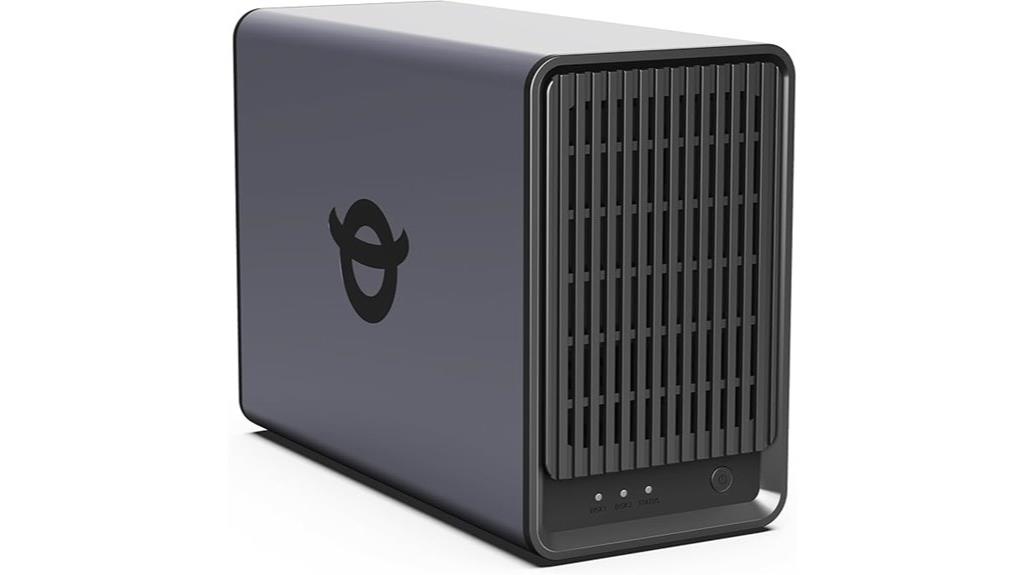
The Yxk Zero1 2-Bay Desktop NAS with Quad-Core CPU is an ideal choice for home users and small teams seeking a secure, scalable storage solution without ongoing cloud subscription costs. It features enterprise-grade capabilities like RAID redundancy, automated backups, and snapshot recovery to protect against drive failures. You can easily expand storage by adding or upgrading drives, making it a flexible, one-time hardware investment. Its proactive health monitoring provides real-time status updates to prevent data loss. Setup is quick with QR code scanning, and its intuitive app streamlines management, collaboration, and privacy controls—delivering a powerful, quiet, and sleek device perfect for personal and small business use.
Best For: home users and small teams seeking a secure, scalable, and cost-effective personal cloud storage solution with easy setup and robust data protection.
Pros:
- Enterprise-grade features like RAID redundancy, automated backups, and snapshot recovery for data security.
- Seamless storage expansion without ongoing cloud subscription costs, offering a flexible, one-time hardware investment.
- User-friendly setup via QR code and comprehensive app for easy management, collaboration, and privacy control.
Cons:
- Limited to 2 drive bays, which may restrict maximum storage capacity for larger needs.
- May require some technical familiarity for optimal configuration and maintenance.
- Compact design might limit upgrade options or advanced hardware customization.
LincStation N1 6-Bay NAS Storage with 16GB RAM and 128GB eMMC

If you’re looking for a high-performance NAS with ample memory and fast storage options, the LincStation N1 6-Bay NAS is an excellent choice. It features an Intel Celeron N5105 quad-core processor, 16GB of RAM, and 128GB eMMC storage, handling multitasking and 4K media smoothly. Its flexible design supports two 2.5″ SATA drives and four NVMe SSDs, with impressive transfer speeds around 850MB/s. Connectivity options include 2.5GbE, USB-C, HDMI, and multiple USB ports. While it’s powerful and compact, some users report hardware quirks and licensing issues. Overall, it’s a solid option for tech-savvy users seeking speed and expandability in a sleek package.
Best For: tech-savvy users seeking a high-speed, expandable NAS with powerful hardware and multimedia capabilities.
Pros:
- Fast transfer speeds around 850MB/s with NVMe SSDs and 2.5GbE connectivity
- Robust hardware including Intel Celeron N5105 quad-core CPU and 16GB RAM for multitasking and media streaming
- Flexible 6-bay design supporting both SATA HDDs and NVMe SSDs for customizable storage solutions
Cons:
- Limited OS support with no hardware RAID or RST, requiring software-level configurations
- Potential hardware quirks such as unreliable power buttons, loud startup beeps, and bright activity LEDs
- Licensing and firmware issues, including difficulties with Unraid and security vulnerabilities due to undocumented web access
Western Digital 4TB My Cloud Home Personal Cloud
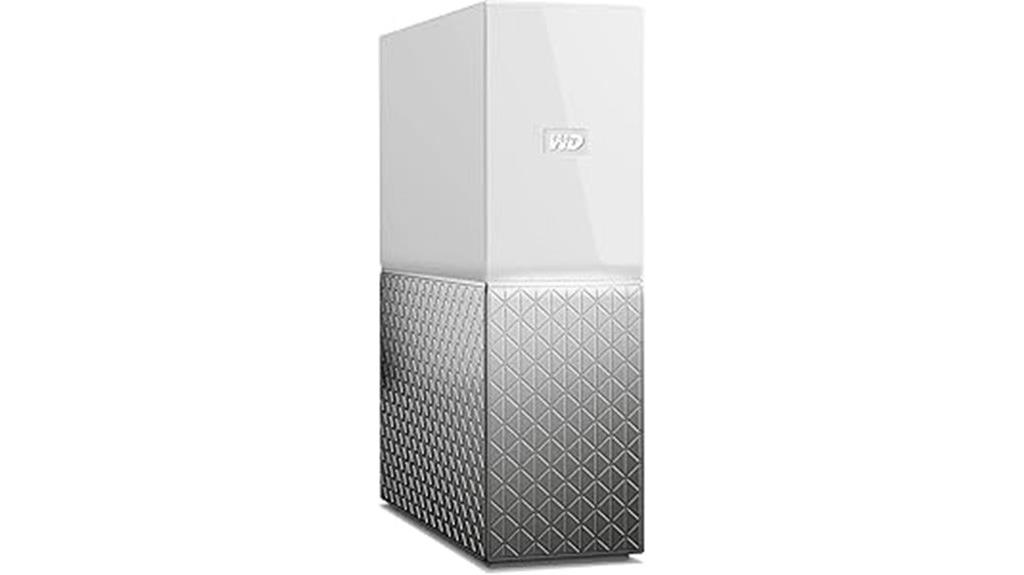
For anyone looking to centralize their media and files effortlessly, the Western Digital 4TB My Cloud Home Personal Cloud stands out as an ideal solution. Its simple setup via a smartphone app makes managing and accessing data easy, even for beginners. With 4TB of storage, it comfortably holds photos, videos, music, and documents. It auto-backs up mobile photos and videos, plus supports PC and Mac backups, ensuring your data stays safe. Its sleek white design fits seamlessly into any space. Although it offers no data transfer speed, its user-friendly interface and reliable storage make it a versatile option for personal cloud needs in 2025.
Best For: individuals seeking an easy-to-use, reliable personal cloud solution for backing up and centralizing their photos, videos, music, and files at home or on the go.
Pros:
- Simple setup and management via a smartphone app, ideal for beginners.
- 4TB of ample storage capacity for large media collections.
- Auto-backup feature for mobile photos and videos, plus support for PC and Mac backups.
Cons:
- No data transfer speed (0 Gbps), which may limit performance during data transfers.
- Limited to operating temperature range of 5°C to 35°C, which may restrict placement options.
- Lacks advanced features like remote access or additional connectivity options.
UGREEN NASync DXP4800 4-Bay Desktop NAS
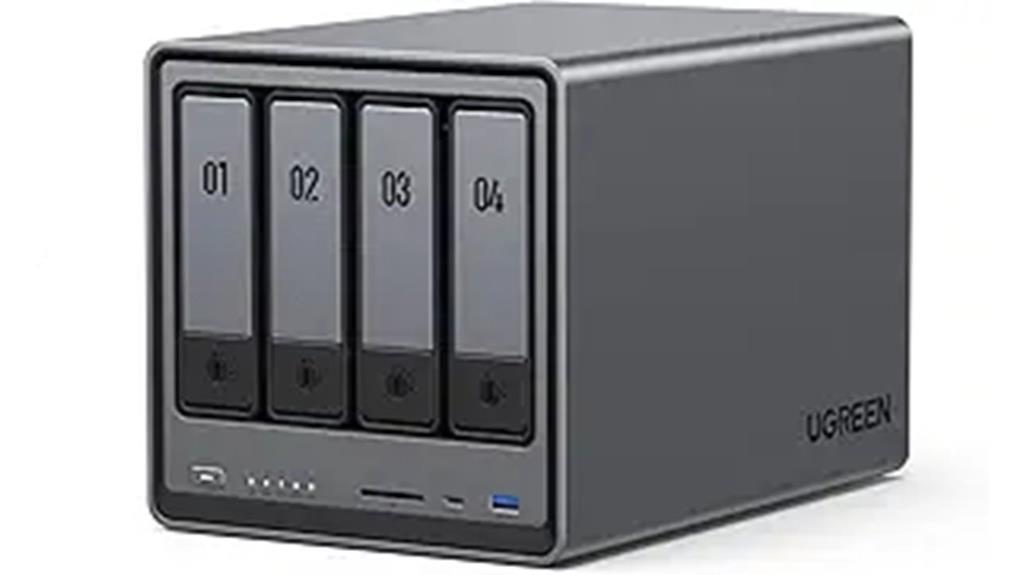
Designed for home users and small offices seeking an affordable yet powerful storage solution, the UGREEN NASync DXP4800 4-Bay Desktop NAS combines hardware performance with user-friendly features. It’s powered by an Intel N100 quad-core CPU, 8GB DDR5 RAM (expandable), and supports up to 136TB of storage with third-party drives. Dual 2.5GbE ports ensure fast network transfers, while two M.2 NVMe slots and multiple USB ports add expandability. The system runs smoothly, with transfer speeds reaching over 730MB/s with cache drives. Its quiet operation, efficient thermal management, and intuitive web interface make it ideal for seamless storage, media streaming, and remote access in any home or small office.
Best For: home users and small offices seeking an affordable, high-performance NAS with easy setup and media streaming capabilities.
Pros:
- Powerful hardware with Intel N100 quad-core CPU and expandable 8GB DDR5 RAM for smooth multitasking
- Supports up to 136TB of storage and fast network transfer speeds over dual 2.5GbE ports
- User-friendly web interface with multimedia features, remote access, and extensive app support including Docker
Cons:
- Requires technical knowledge for OS customization or advanced configurations like Windows Server or UnRAID
- Limited space for heatsinks may necessitate careful thermal management during extended full loads
- External drive connections via USB may have performance limitations depending on device and connection speed
Western Digital 8TB My Cloud EX2 Ultra NAS
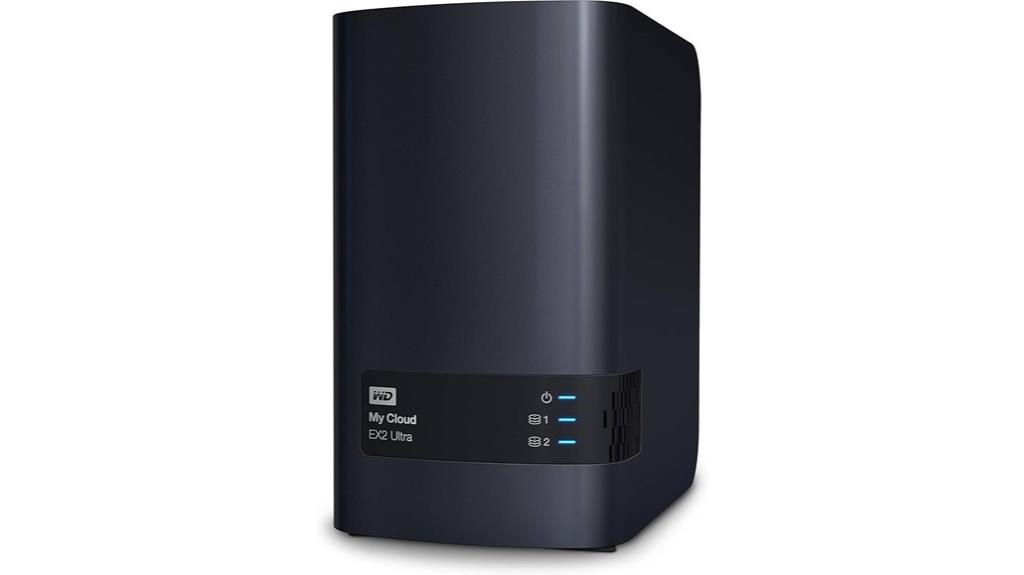
The Western Digital 8TB My Cloud EX2 Ultra NAS stands out as an excellent choice for users who need reliable, high-performance network storage that’s easy to access from anywhere. Its powerful 1.3 GHz dual-core processor ensures smooth, lag-free streaming, while 1GB of DDR3 memory supports multitasking. This device offers centralized storage, making it simple to access files remotely and automatically syncs your data across all computers. Sharing files and folders is straightforward, enhancing user convenience. Overall, the My Cloud EX2 Ultra combines speed, reliability, and ease of use, making it a top contender for seamless storage in 2025.
Best For: users seeking a reliable, high-performance NAS solution for seamless remote access, file sharing, and multitasking in both personal and small business environments.
Pros:
- High-performance 1.3 GHz dual-core processor ensures smooth streaming and quick data access
- 1GB DDR3 memory supports efficient multitasking and system responsiveness
- Automatic file synchronization and easy sharing features enhance user convenience
Cons:
- Limited to 8TB storage capacity, which may require expansion for very large data needs
- No mention of advanced security features in the provided details
- May be more complex to set up for users unfamiliar with NAS devices
Western Digital My Cloud Home 4TB NAS

If you’re looking for a straightforward, user-friendly way to centralize your digital content, the Western Digital My Cloud Home 4TB NAS is an excellent choice. It connects directly to your Wi-Fi router, making setup quick and easy—just plug in and configure with your smartphone, no computer needed. With 4TB of storage, it handles photos, videos, music, and files from multiple devices. You can access and share your content remotely via the app or web, and it supports automatic backups for phones. Plus, it’s compatible with various operating systems and streaming devices, making it versatile for home media and smart device integration.
Best For: home users seeking an easy-to-use, centralized storage solution for photos, videos, music, and files across multiple devices without complex setup.
Pros:
- Simple plug-and-play setup via Wi-Fi router, no computer required
- 4TB of storage capacity suitable for large media libraries
- Supports remote access and automatic backups from smartphones
Cons:
- Access is only available through internet-based applications, limiting local connectivity options
- Requires a compatible Wi-Fi router and internet connection for setup and use
- May have limited advanced customization features for power users
TechMikeNY Server 2X Gold 6154 3.00Ghz 36-Core 64GB RAM 4X New 1TB PowerEdge R640 NVMe

For organizations seeking powerful, reliable server solutions, the TechMikeNY Server 2X Gold 6154 stands out with its 36-core, 3.00GHz processor and 64GB of RAM, making it ideal for demanding cloud-connected NAS environments. Its 4x 1TB NVMe drives ensure fast data access and transfer speeds, optimized for intensive workloads. Built within a PowerEdge R640 chassis, it’s designed for seamless deployment and scalability. Certified under R2, ISO 9001, 14001, and 45001 standards, it guarantees quality, safety, and environmental compliance. Refurbished through proprietary testing, it offers dependable performance, making it a robust choice for organizations needing high-performance, secure storage solutions.
Best For: organizations seeking a high-performance, reliable server solution optimized for demanding workloads, cloud-connected NAS environments, and scalable storage needs.
Pros:
- Powerful 36-core, 3.00GHz processor ensures exceptional processing capability for intensive applications
- 64GB RAM and 4x 1TB NVMe drives provide fast data access, transfer speeds, and robust multitasking
- Certified with R2, ISO 9001, 14001, and 45001 standards, guaranteeing quality, safety, and environmental compliance
Cons:
- May require technical expertise for installation and configuration due to advanced hardware features
- Refurbished components, while tested and reliable, might have limited warranty compared to new servers
- Higher initial investment compared to lower-specification or less scalable server options
Synology RackStation RS4021xs+ NAS Server with Xeon CPU and 288TB Storage

Designed for growing businesses with demanding multi-user workloads, the Synology RackStation RS4021xs+ stands out as an ideal cloud-connected NAS solution. It features a powerful Xeon D-1541 8-core CPU and 64GB ECC RAM, delivering exceptional performance. With support for up to 288TB across 16 drives, it offers scalable, high-capacity storage. The system includes multiple LAN ports, including 10GbE for fast network access, plus USB and expansion options. Its sealed chassis provides protection, while the Btrfs file system guarantees data integrity, snapshots, and efficient management. Overall, it’s engineered to handle intensive workloads securely and reliably in demanding environments.
Best For: growing small to medium-sized businesses requiring high-capacity, secure, and high-performance multi-user NAS storage solutions.
Pros:
- Powerful Xeon D-1541 8-core processor delivers robust performance for demanding workloads.
- Scalable storage capacity up to 288TB with 16 drive bays, suitable for expanding needs.
- Multiple high-speed network ports, including 10GbE, enhance connectivity and data transfer speeds.
Cons:
- Hard drives and memory upgrades are sold separately, adding to initial setup costs.
- The system’s complexity may require technical expertise for installation and maintenance.
- The sealed chassis, while protective, may make hardware upgrades and repairs more challenging.
WD 6TB My Passport Portable External Hard Drive with Backup Software and Password Protection

The WD 6TB My Passport Portable External Hard Drive is an excellent choice for anyone needing secure, high-capacity storage on the go. Its slim, durable design makes it easy to carry, while offering up to 6TB of space for photos, videos, and files. Supporting USB 3.1 and 3.0 guarantees fast transfers across a wide range of devices. Built-in password protection and hardware encryption keep sensitive data safe. Plus, the included backup software provides smarter management and ransomware defense. Recognized as the first 6TB portable drive in its class, it combines portability, security, and ample storage in one reliable package.
Best For: individuals seeking a high-capacity, portable external hard drive with enhanced security features for storing and protecting large files on the go.
Pros:
- Offers a massive 6TB storage capacity suitable for large files and backups
- Supports USB 3.1 and 3.0 for fast data transfer speeds across various devices
- Includes password protection and hardware encryption for data security
Cons:
- May be more expensive than lower-capacity or less feature-rich external drives
- Requires compatible software and hardware for optimal security and backup functions
- As a portable device, it may be vulnerable to physical damage if not handled carefully
Factors to Consider When Choosing a Cloud‑Connected NAS Device
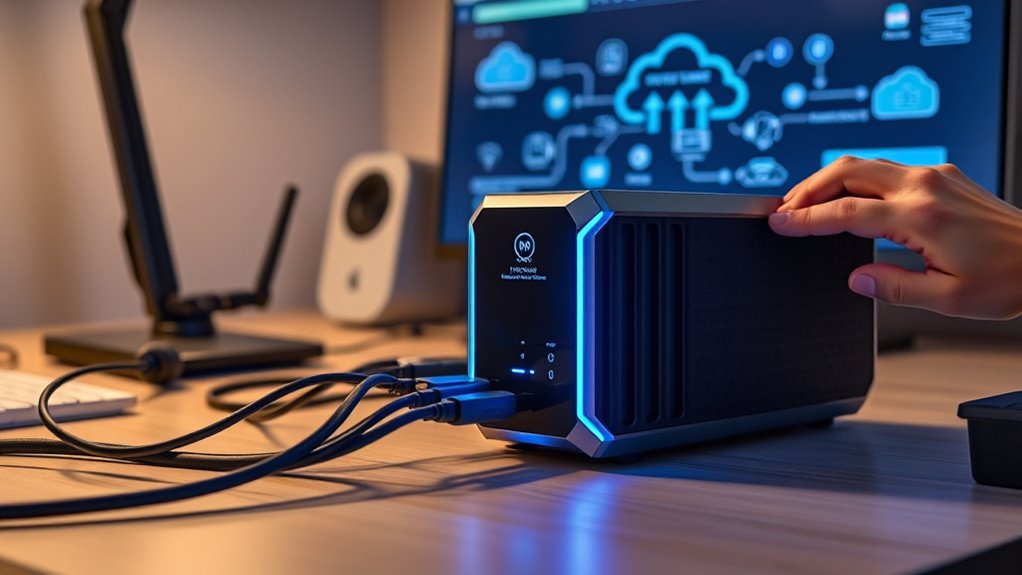
When selecting a cloud-connected NAS device, I consider several key factors to guarantee it meets my needs. Things like storage capacity, device compatibility, security features, setup process, and network performance all play a role. Focusing on these points helps me find the right balance between functionality and ease of use.
Storage Capacity Needs
Choosing the right storage capacity for your cloud-connected NAS device depends on understanding both your current data needs and how those needs might grow over time. I recommend evaluating your existing data volume and projecting future growth to avoid running out of space. If you handle large media files like 4K videos or high-resolution photos, you’ll need more storage upfront. Also, consider whether your device supports expansion, such as additional drives or capacity upgrades, which can save money long-term. Higher capacities, like 12TB or 16TB, are ideal for extensive media libraries or business archives. Balance your storage requirements with your budget, aiming for a solution that offers scalability without unnecessary overspending. This approach ensures your NAS adapts as your data demands evolve.
Compatibility With Devices
Selecting a compatible NAS device requires ensuring it works smoothly with all the devices and operating systems you use daily. I check that it supports Windows, macOS, Android, and iOS for seamless connectivity. Compatibility with common network protocols like SMB, AFP, NFS, and DLNA is essential for easy file sharing across different devices. I also look for dedicated apps or software for smartphones, tablets, and computers to simplify setup and management. Remote access via web browsers or mobile apps is a must, so I can access files from anywhere. If I plan to stream media or integrate with home automation, I verify compatibility with smart TVs, media players, and other smart systems. Ensuring device compatibility minimizes future issues and guarantees smooth operation across my entire digital environment.
Security and Privacy Features
Ensuring your NAS device offers robust security and privacy features is crucial for protecting your data. Look for models with encryption certified by TRUSTe or TÜV SÜD, which guarantees strong data security. Automatic data encryption and secure user authentication methods like two-factor authentication help prevent unauthorized access. Granular permission controls are equally important, allowing you to restrict access at folder or file levels for better privacy. Verify if the device maintains a zero-knowledge privacy policy, guaranteeing the provider cannot access your stored data. Additionally, features like automatic backups, secure remote access, and regular firmware updates are essential to guard against vulnerabilities and data breaches. Prioritizing these security features helps ensure your data remains private and protected in a cloud-connected environment.
Ease of Setup
When evaluating a cloud-connected NAS device, ease of setup is a key factor that can save you time and frustration. Look for models with simple procedures like NFC pairing or quick QR code scans to speed up initial configuration. An intuitive web interface and management app should make it easy to set network parameters, user permissions, and storage options without needing advanced technical skills. Features like automatic detection of compatible drives and guided setup wizards help you get started quickly. Plug-and-play connectivity and minimal hardware requirements make the process straightforward, even for beginners. Additionally, clear, step-by-step instructions, video tutorials, and responsive customer support can further ease setup, ensuring you get your device up and running with minimal hassle.
Network Speed and Ports
The network ports on a NAS substantially influence data transfer speeds and overall network performance. Ports like 1GbE, 2.5GbE, or 10GbE determine how quickly data moves between the device and your network. Higher-speed ports enable faster file transfers and smoother streaming, especially important for large media files or backups. Multi-port configurations support link aggregation, combining multiple connections for increased bandwidth and redundancy, which enhances reliability. The internal network speed capabilities also matter; a fast internal NIC ensures quick access to stored data. While Wi-Fi 6 and Bluetooth 5.2 can improve wireless connectivity, they often require extra hardware or virtual setups. Compatibility with your existing network infrastructure is key to achieving ideal transfer rates and stable connections.
Backup and Recovery Options
Choosing the right backup and recovery options for a cloud-connected NAS is essential to safeguarding your data. I look for devices that offer automated backups, like scheduled tasks and real-time synchronization, to minimize the risk of data loss. It’s important that the NAS supports multiple recovery methods, such as snapshots, version history, and external restores, providing flexibility when restoring files. Seamless integration with cloud backup services or simple data transfer to cloud storage ensures off-site protection. Security features like encryption are crucial to keep backup data safe from unauthorized access. Additionally, I prioritize user-friendly interfaces and extensive recovery tools, making it easy to restore data quickly and accurately without hassle. These factors together ensure reliable, secure, and efficient backup and recovery processes.
Cost and Long-term Savings
Investing in a cloud-connected NAS device can lead to significant long-term savings, especially when you consider the costs associated with cloud storage subscriptions. Over ten years, a single purchase of a NAS can save you more than $6,500 compared to ongoing cloud fees. Cloud subscriptions often require recurring payments that add up quickly, whereas a NAS involves an upfront cost with no ongoing fees for storage or access. Choosing a device with expandable storage can further reduce expenses by avoiding frequent upgrades. The total cost of ownership diminishes over time because you won’t be paying monthly or yearly for data storage. Carefully weighing initial hardware costs against long-term cloud fees guarantees a more cost-effective, sustainable data management solution.
AI and Smart Features
When evaluating cloud-connected NAS devices, it’s important to take into account their AI and smart features, which can greatly enhance how you manage and access your data. AI capabilities enable automatic recognition and categorization of photos by faces, objects, or scenes, making media organization effortless. Smart features like semantic search allow you to find specific content quickly using natural language queries. Advanced AI algorithms can identify and delete duplicate files, saving storage space and reducing clutter. Machine learning helps detect anomalies or security threats proactively, boosting data protection. Integration of these features often includes real-time backups, automated tagging, and intelligent media streaming, delivering a seamless user experience. Choosing a NAS with robust AI and smart features can truly streamline your storage and media management in 2025.
Frequently Asked Questions
How Secure Are Cloud-Connected NAS Devices Against Cyber Threats?
Cloud-connected NAS devices are generally secure, but no system is completely invulnerable. I make sure to enable strong passwords, two-factor authentication, and regular firmware updates to protect my data. I also use encryption for sensitive files and back up regularly. While these measures markedly reduce risks, it’s important to stay vigilant, as cyber threats evolve constantly. Staying informed and maintaining good security habits keeps my data safer.
Can NAS Devices Automatically Sync With Multiple Cloud Services Simultaneously?
Yes, many NAS devices can automatically sync with multiple cloud services simultaneously. I’ve found that modern NAS units often come with built-in apps or integrations that let me connect to services like Google Drive, Dropbox, or OneDrive. This feature makes my data management seamless, ensuring my files are always up-to-date across platforms. It’s convenient and saves me time, giving me peace of mind knowing my backups are consistent and accessible everywhere.
What Is the Typical Energy Consumption of These NAS Devices?
Imagine a small business using a cloud-connected NAS; on average, it consumes about 15-30 watts during active use. I’ve seen models that sip power in standby, around 5-10 watts. Typically, these devices are energy-efficient, especially newer ones designed for constant connectivity. So, while they do use electricity, their consumption remains quite manageable, making them a practical choice for continuous, seamless storage without skyrocketing energy bills.
Are There Compatibility Issues With Certain Operating Systems or Devices?
Yes, I’ve found that some NAS devices can have compatibility issues with certain operating systems or devices. For example, older versions of Windows or macOS might struggle with some features, and Android or iOS devices sometimes need specific apps to connect smoothly. To avoid problems, I always check the device’s compatibility list and updates before making a purchase, ensuring seamless integration with my existing setup.
How Do Firmware Updates Impact Device Stability and Data Security?
Firmware updates are like a superhero shield for your NAS device—they dramatically boost stability and lock down security. I’ve seen outdated firmware cause crashes and vulnerabilities, so I always keep mine current. Regular updates patch bugs, fix security flaws, and improve performance. Skipping them risks data breaches or sudden failures. Trust me, staying updated is the best way to keep your storage safe and running smoothly—it’s absolutely essential.
Conclusion
Choosing the right cloud-connected NAS is like finding the perfect key to a locked treasure chest—it unlocks seamless storage and effortless access. I once struggled with scattered files until I found a device that integrated my cloud and local storage effortlessly. Remember, the right NAS makes your data as accessible as air—every time you need it, it’s there. Pick wisely, and your digital world will flow smoothly, just like a well-oiled machine.


